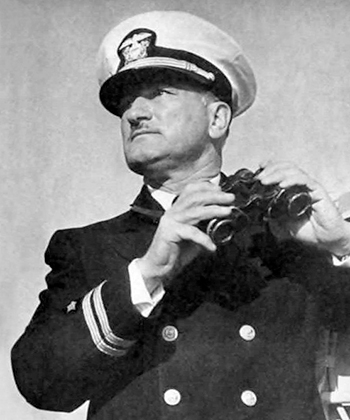
|
McClelland "Mac" Barclay |
 |
|||
| Rank, Service | ||||
Lieutenant Commander, U.S. Navy |
||||
| Veteran of: | ||||
|
||||
| Tribute: | ||||
Mac Barclay was born on May 9, 1891, in St. Louis, Missouri. He studied art at the Art Institute of Chicago, the Art Students League of New York, the St. Louis School of Fine Arts, and the Corcoran School of Art in Washington, D.C. During World War I, Barclay created the poster "Fill the Breach", for which he was awarded the Navy Poster Prize by the Committee on National Preparedness. He also joined the group of artists by the U.S. Navy to improve ship camouflage during that war. Between the World Wars, Barclay produced paintings, jewelry, sculptures, and many famous commercial advertisements. He was commissioned in the U.S. Navy Reserve on June 13, 1938, as an Assistant Naval Constructor with the rank of Lieutenant, and transferred to the Line of the Naval Reserve as an Engineer Officer, CC-V(S), on June 25, 1940. LT Barclay went on active duty in the U.S. Navy on October 19, 1940, and served with the Naval Recruiting Bureau for Publicity Work at Norfolk, Virginia, from October 1940 to May 1942, where he created many of the most famous recruiting posters for the U.S. Navy at the beginning of World War II. During this time he also developed methods of camouflage for ships and aircraft, and he designed the Navy and Marine Corps Medal for non-combat heroism. He was promoted to Lieutenant Commander on May 21, 1942, and was assigned to Recruiting Inspector, Northeastern Division, in New York City, in June 1942. His designation was changed to Deck Officer, D-V(S), on September 1, 1942, so that he could deploy as an artist aboard combat ships, and both before and after this time he served aboard the battleships USS Arkansas (BB-33), USS Pennsylvania (BB-38), USS Maryland (BB-46), and the light cruiser USS Honolulu (CL-48). LCDR Barclay was creating artwork aboard the tank landing ship USS LST-342 when it was torpedoed and sunk during the New Georgia campaign in the Pacific Theater on July 18, 1943, and he was officially listed as Missing in Action until being declared dead one year later, on July 19, 1944. His remains were never recovered. |
||||
|
||||

